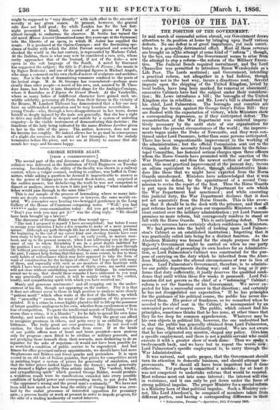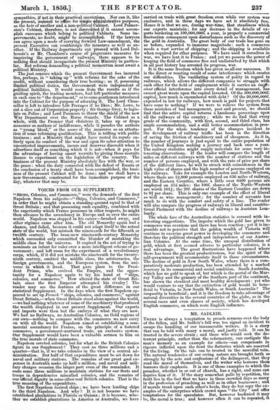TOPICS OF THE DAY.
THE POSITION OF THE GOVERNMENT.
Irr mid march of sueoessful action abroad, our Governinent drawi attention to its position at home by bringing upon itself varioui defeats. No one defeat is of great importance, yet each contrl-- butes to a generally. detrimental effect. Most of those reversei are brought on in'the attempt at some kind of "reform " ; though, ly the bye, one dilemma of the Government seems to arise from the attempt to stof a reform—the reform of the Military. Execu- tive. The Judicial Bench required recruitment, and the Lard Chancellor was permitted to introduce Baron Wensleydale as a Life Peer. The Lords mutinied; and Government, intending a practical reform, not altogether in a bad fashion, though certainly not in the best way, incurs a disastrous rout. Several imposts upon the shipping of the United Kingdom, levied by local bodies, have long been marked. for removal or abatement; successive Cabinets have had. the subject under their considera- tion; Mr. Lowe introduces a bill ; the boroughs of the United Kingdom rise in rebellion and Mr. Lowe's bill i abandoned by his chief, Lord Palmerston. The boroughs and counties are' sounding the tocsin against Sir George Grey's Police Bill : they are flushed with the expectation of victory, while Ministers she* a corresponding depression, as if they anticipated defeat. The reconstruction of the War Department was rendered impera- tively necessary by the unfit state of our organization for war under the present circumstances of the world ; the improve- ments began under the Duke of Newcastle, and they were con- tinued under Lord Panmure, better than some persons anticipated. There has been unquestionable improvement in the working of. the administration; but the official Commission sent out to the Crimea, under the necessity forced upon Ministers by the Sebas- topol Committee, has fastened serious charges upon three officers whom the Horse Guards have promoted with the sanction of the War Department ; and thus the newest section of our Goverth meat, the most practical improvement at the present day, incurs an odium equivalent to defeat, through administrative blun ders like those that we might have expected from the Horse Guards unredeemed. Ministers have acknowledged that it mil equivalent to defeat, by the appointment of a second Com- mission to revise the report of the first. Thus the Horse Guards is put upon its trial by the War Department for acts which the War Department had sanctioned ; and while executing this judicial duty, the War Department declares that it does not act separately from the Horse Guards. This is like avow- ing that it should be in the dock with the prisoner, and that all past refcirms have not yet given our responsible Ministers a suffi- cient control over the military administration ; yet Lord Panmure promises no mere reform, but courageously resolves to stand or fall with the Horse Guards. This is anticipating defeat. These successive reverses have certainly shaken confidence in Ministers. We had grown into the habit of looking upon Lord Palmer- ston's Cabinet as an established institution ; forgetting that it was practically called into being for a distinct function. As the Aberdeen Ministry was formed for the simple purpose that her Majesty's Government might be carried on when no one party appeared capable of presenting its own leaders for an Administa-a- bon, so Lord Palmerston's Cabinet was constructed for the pur- pose of carrying on the duty which he inherited from the Aber- deen Ministry, wider the altered circumstances of war in lieu of peace. Lord Palmerston's Government, therefore, is to adminis- ter our public departments during 'war; and so long as it per- forms that duty sufficiently, it justly deserves the qualified confi- dence that until within these few weeks it possessed. Lord Pal- merston did not govern as the chief of a " reforming " Cabinet ; reform is not the function of his Government. We never ex- pected for him a successful career in that direction ; and certainly he has not disappointed our expectation.* If he has principles for the guidance of his political course, the public has never dis- covered them. His power of frankness, as we remarked when he acceded to the chief seat in the Cabinet, is accompanied by an unwearied power of reserve. The public, which cannot find his principles, sometimes thinks that he has none, at other times that they he too deep for common apprehension. Whatever may be his own objects in political life, however, the one undoubted fact is, that the public has generally obtained from Lord Palmerston, at any time, that which it distinctly wanted. We are not aware that he has originated any missitin, shaped any policy. Give him a specific employment, and there is not a public servant who could execute it with a greater show of work done. Thus we spoke a twelvemonth back, and we have but to repeat the words now : Lord. Palmerston's specific employment is, to carry through the: War Administration.
It was natural, and quite proper, that the Government should. turn its attention to domestic business, and should attempt im- provements. We should all have been impatient had it done otherwise. Yet perhaps it committed a mistake ; for at least it was not competent to undertake reforms that would be resisted. Most reforms must cut into some interest ; the interest will rise in resistance, and it can only be lint down under the force of
strong. political impulse. The proper Ministry for a special reform is a Ministry born of that political impulse. Such a • try can- not, like Lord Aberdeen's, be composed of members taken from different parties, and having a corresponding difference in their • " Palmerston, Premier"—Spectator, 10th February 1855.
mpathies, if not in their practical convic ons. Nor can it, like the present, )misceed to office for 'simple 4diiinisfrative purposes, as the heir of another and a non-political Cabinet. Lord Palmer- ston's Cabinet, therefore is not discreclited.if it cannot accom-
plish successes which belong to politiCal Cabinets. Some im- provements, no doubt, might be aceomplished. If the lawyers can agree upon a mode of carrying forwifrd Law-amendment, the present Facecutive can countersign the `Measures as well as an- other. It the Railway departments can proceed. with Lord Dal- housie's or Mr. Cha.mbers's course of progressive measures for imp...eying the 'government of railways, there appears to be nothing that should incapacitate the present Ministry in particu- lar. But reforms demanding a political momentum must await a political Ministry. The just censure which the present Government has incurred lies, perhaps, in " taldng up" with reforms for the sake of the credit, without considering their true heaving; as if, possessing limited political duties, the Government were independent of political liabilities. It would seem froin the results as if the guiding spirit, the leading member, had left particular measures in each ease to "the department," or to some gentleman introduced into the Cabinet for the puipose of adorning it. The Lord Chan- cellor is left to introduce Life Peerages if he likes; Mr. Lowe, to cut a slice out of Corporation property ; Sir George Grey, to legis- late on Police ; and. lord Panmure to throw the shield of the new War Department over the Horse Guards. The Cabinet as a whole, with the Premier that cliristeng it, takes up or drops measures as matters of indifference, while it parades the authors as "young' blood," or the name of the measures as an attesta- tion of some reforming qualification. This is trifling with public business ; and a Ministry that might have rested its repute en- tirely upon its conduct of the war and upon its sober attention to uncontested improvements, incurs and deserves discredit when it advertises itself as something which it is not—when it pays for the advantage of having smart recruits by giving those recruits licence to experiment on the legislation of the country. The business of the present Ministry absolutely lies with the war, or the peace : when the duty connected with the defeat of Bassi; or the conclusion of a treaty shall have been accomplished, the busi- ness of the present Cabinet will be done; and we shall have a new Government, constructed for the immediate purpose of the day, whatever that may be.



































 Previous page
Previous page